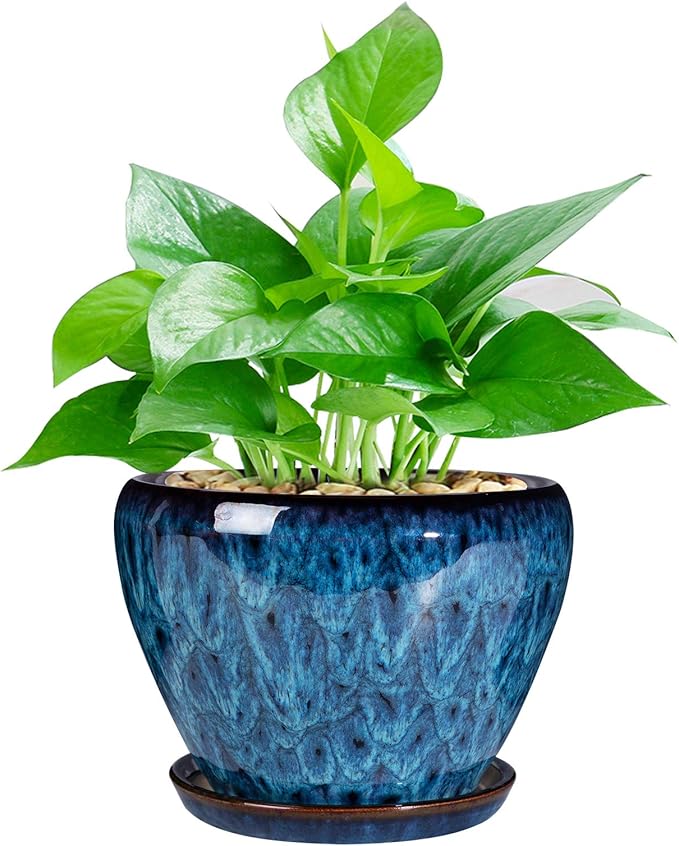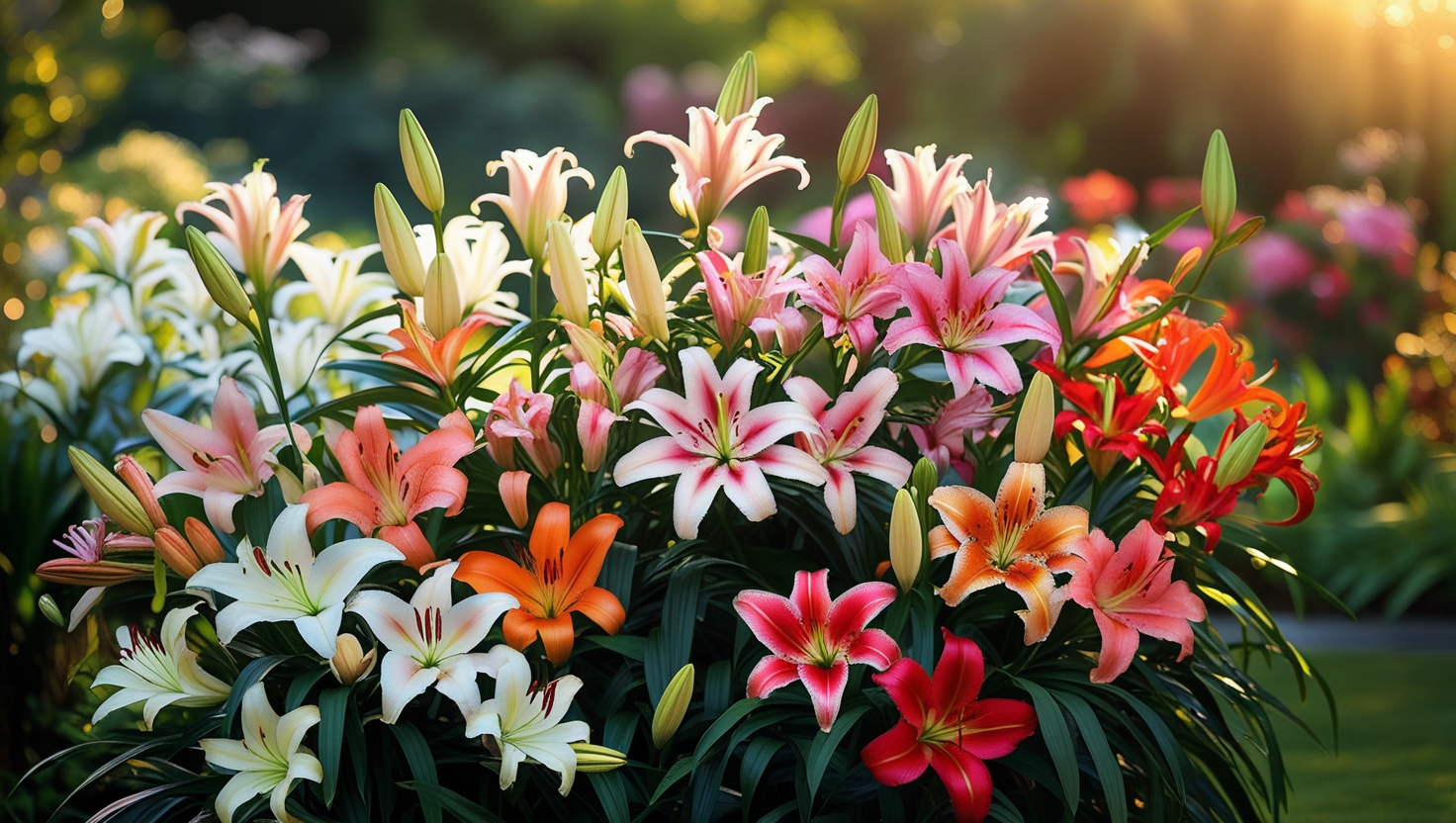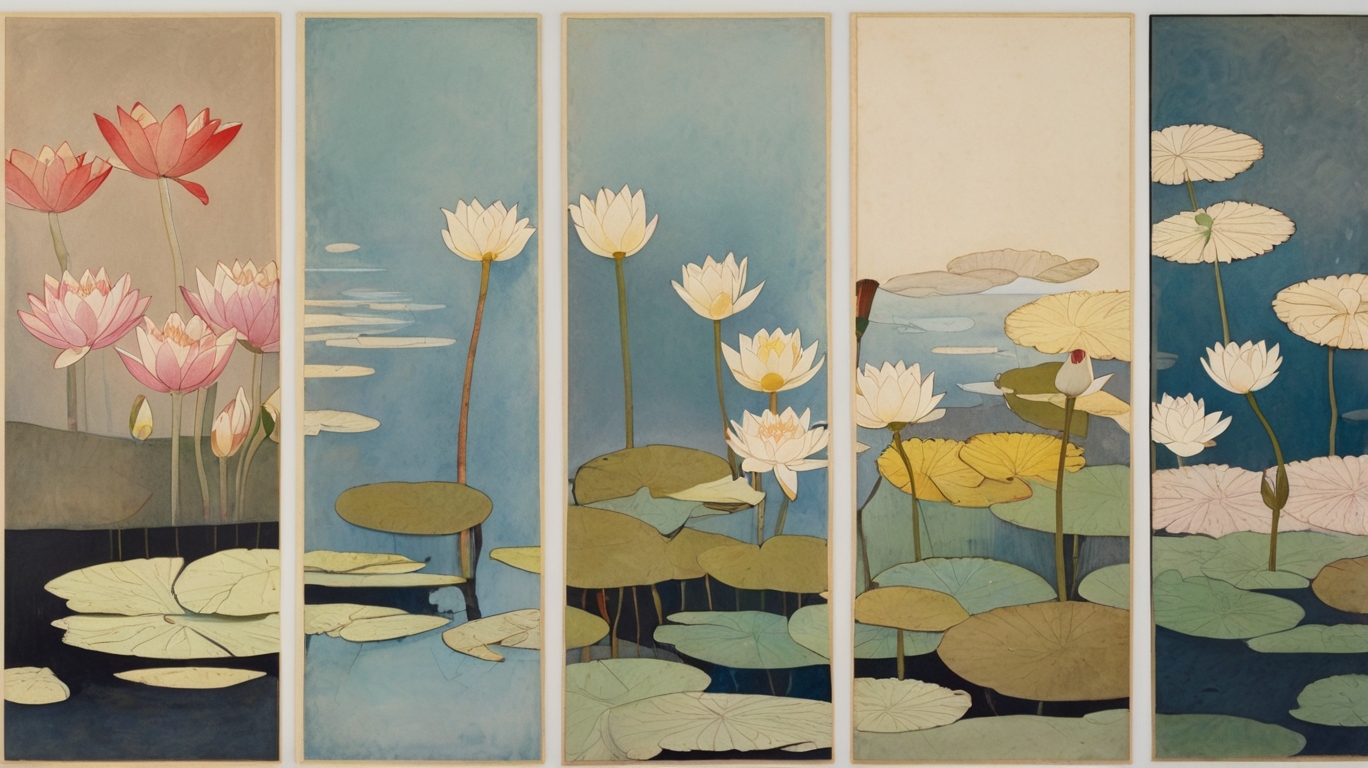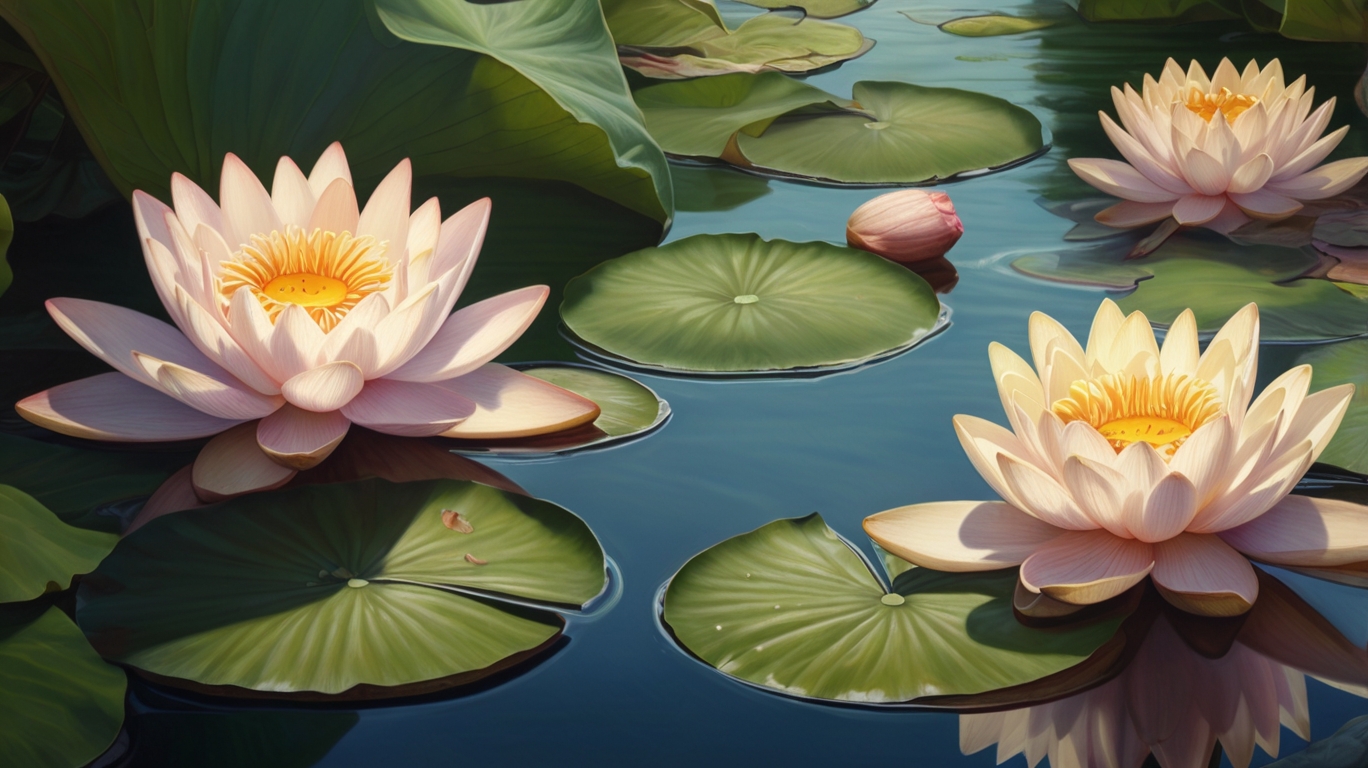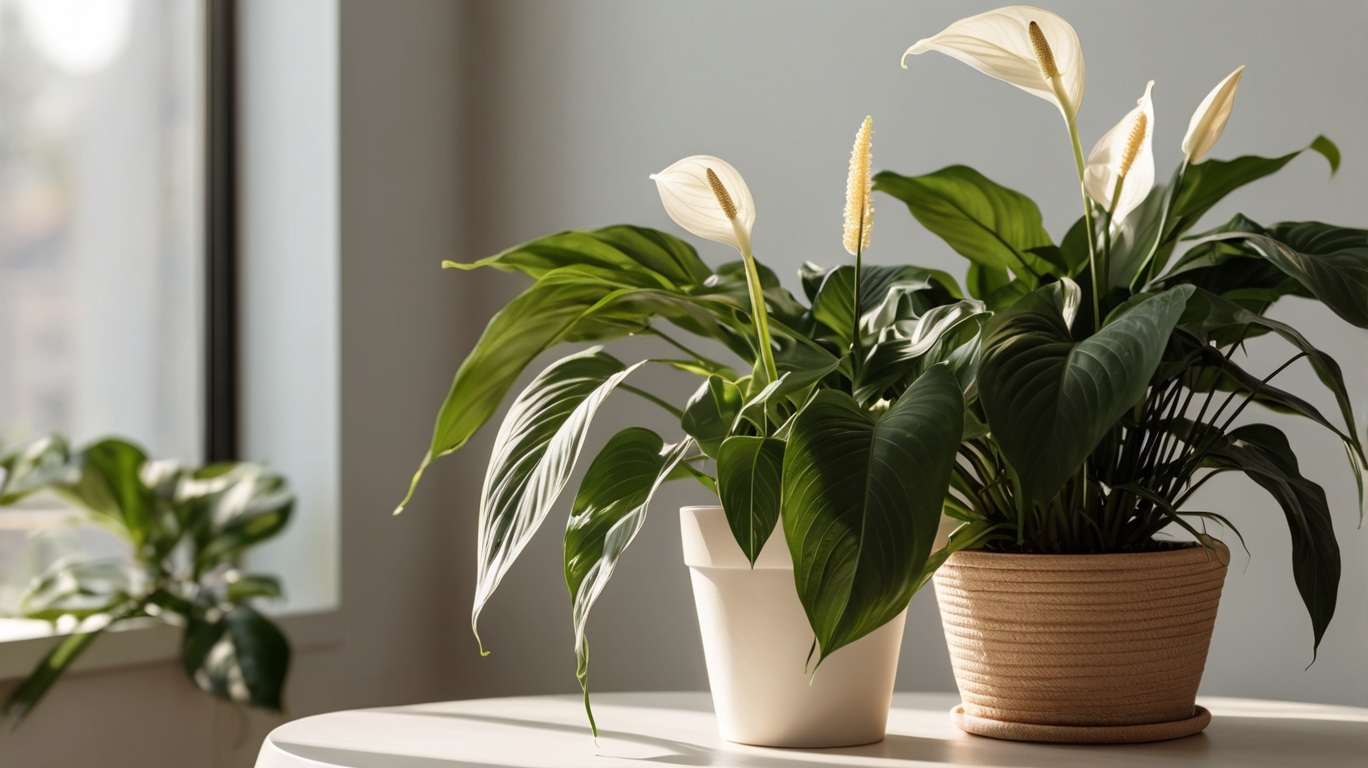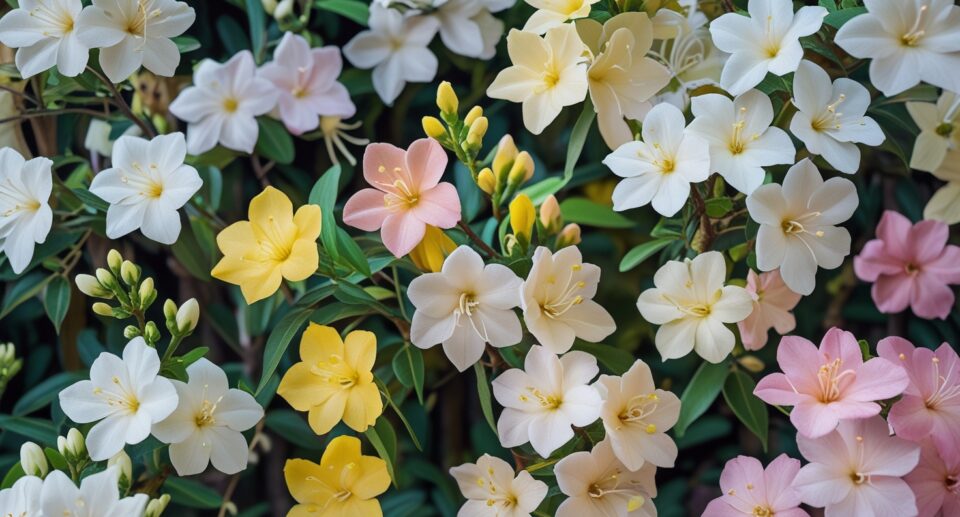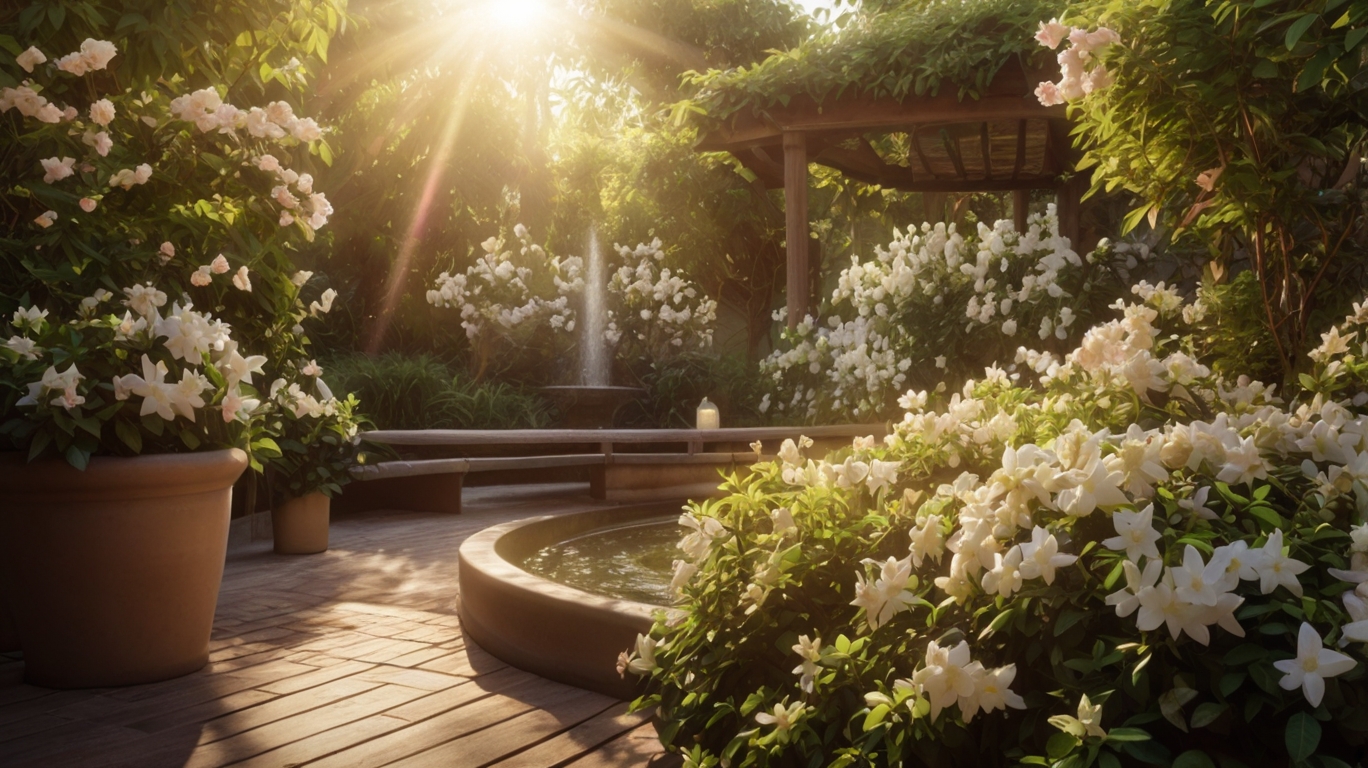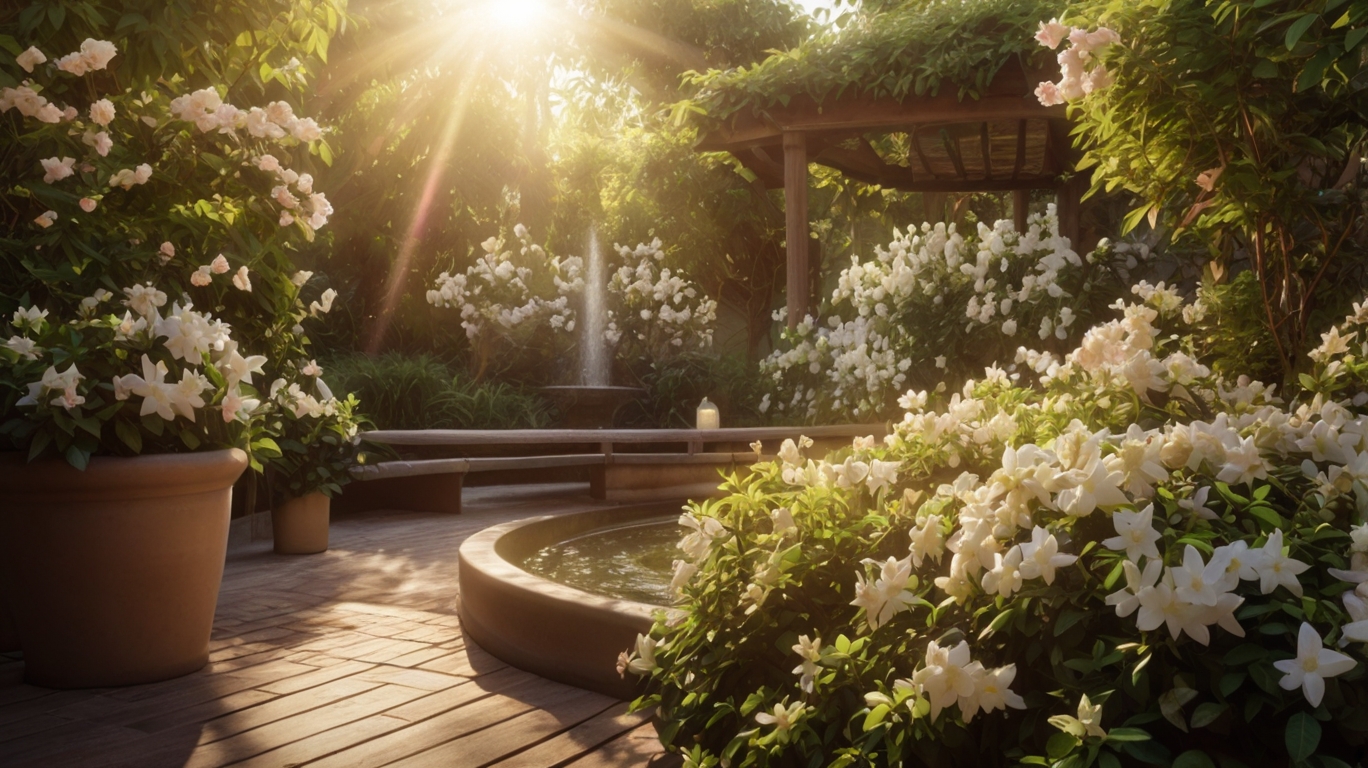What Does Jasmine Flower Symbolize? 1 Deep Dive into Its Meaning and Significance
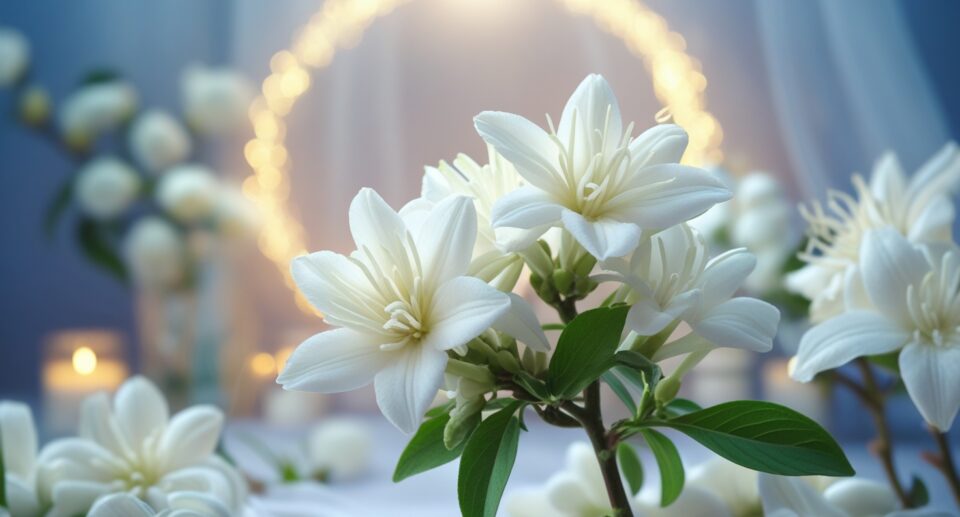
Introduction
Jasmine flowers, known for their sweet fragrance and delicate white petals, have captivated people for centuries, symbolizing purity, love, and beauty. Across different cultures, they hold deep significance: in some, they represent romantic love and spiritual purity, while in others, they’re used in weddings and religious ceremonies. Jasmine is also widely used in perfumes, teas, and essential oils for its calming and soothing properties. More than just a beautiful flower, jasmine plays a meaningful role in cultural rituals, emotional expressions, and daily wellness, making it a timeless symbol cherished around the world.
The General Symbolism of the Jasmine Flower
The jasmine flower holds significant symbolic meaning, largely influenced by its physical characteristics, particularly its enchanting fragrance. This flower is often linked to deep emotional themes such as love, purity, beauty, and new beginnings.
Purity and Innocence
One of the most widespread symbolic meanings of jasmine is purity. Its pristine white petals are associated with innocence, which is why it’s often used in weddings to celebrate new beginnings. In various cultures, jasmine represents a fresh start, making it a common choice for newborns or individuals starting a new chapter in life, symbolizing hope and new opportunities.
Love and Romance
Jasmine’s intoxicating fragrance is strongly connected to love and romance. Its scent has long been a symbol of affection, tenderness, and desire in many cultures. This flower is a popular choice for romantic gestures, gifts, and bouquets, signifying the deep emotions involved in intimate relationships. In some traditions, jasmine also represents the nurturing side of love, highlighting care, tenderness, and commitment in a partnership.
Beauty and Elegance
The jasmine flower’s delicate, elegant appearance further enhances its symbolic ties to beauty and sophistication. Its simple yet refined petals evoke a sense of grace and elegance, not just in physical form but also in terms of inner beauty and balance. This symbolic link to beauty and elegance is why jasmine is commonly featured in art, literature, and fashion, where it’s associated with refinement and an idealized sense of grace.
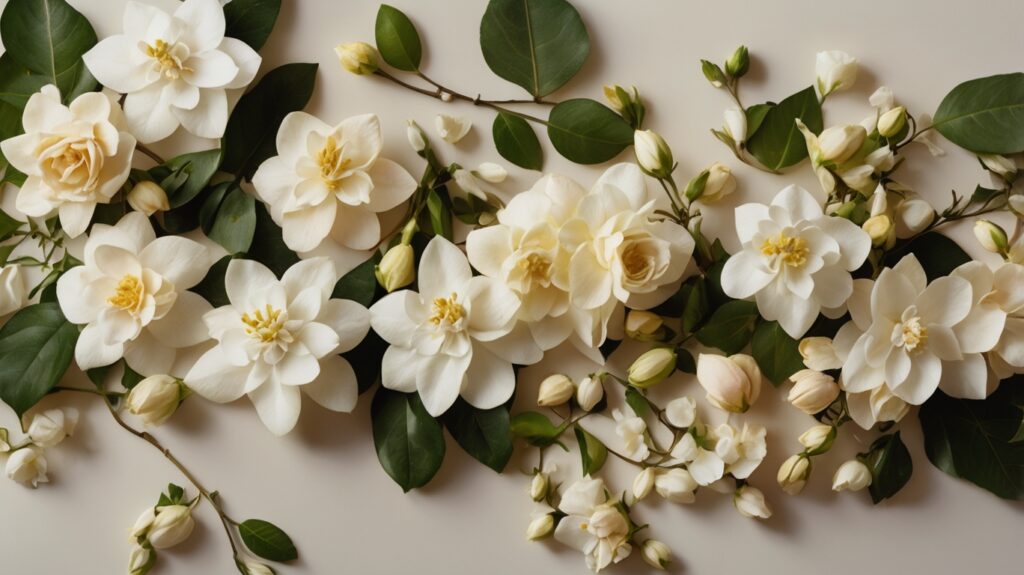
Cultural Significance of Jasmine Flowers
The symbolism of jasmine flowers is rich and diverse, reflecting the flower’s deep cultural and emotional significance in various societies. Across Western and Eastern cultures, as well as in ancient mythology, jasmine holds meanings that transcend its physical beauty and fragrance, tying it to concepts of love, purity, spirituality, and refinement.
Jasmine in Western Cultures
In Western traditions, jasmine is widely regarded as a symbol of love and beauty. During the Victorian era, a time when flowers carried specific meanings in the practice of floriography (the “language of flowers”), jasmine was often associated with sensuality and romantic love. In this context, jasmine was used to convey deep emotions, often in secret, such as between lovers. It was seen as an emblem of passionate love and the intoxicating allure of romance.
Beyond romance, jasmine also came to symbolize modesty and elegance in Western cultures. Its beauty is not overbearing or ostentatious, but rather understated and subtle, which only adds to its charm. This quality of modest beauty has made it a popular subject in various art forms, including poetry, paintings, and sculptures. The flower’s delicate appearance is often contrasted with the complexity of its symbolism, embodying both grace and quiet strength. For instance, in literature, jasmine is sometimes used to represent unspoken love or the pure, subtle beauty of a relationship.
Jasmine in Eastern Cultures
In Eastern traditions, particularly in India and Southeast Asia, jasmine is revered not only for its beauty but for its deep spiritual and cultural significance. In India, jasmine is a highly sacred flower, often associated with the divine. It is frequently used in religious ceremonies and rituals, where it symbolizes purity, spirituality, and divine beauty. Jasmine garlands are often offered to deities in Hindu temples, and the flower is considered an offering of the highest esteem. The fragrant blooms are thought to represent devotion and reverence.
In Southeast Asia, jasmine’s symbolic meaning shifts slightly. Here, the flower is often associated with good fortune and prosperity. Jasmine is commonly used in celebrations, such as weddings or festivals, where it symbolizes blessings and the hope for a prosperous future. The flower’s delicate nature serves as a reminder of life’s fleeting beauty and the preciousness of every moment. It is often included in gifts, rituals, and celebrations, underscoring its role in fostering harmony and joy.
Jasmine in Ancient Mythology
The symbolic significance of jasmine also stretches back to ancient mythology, where it was often tied to love, beauty, and divinity. In Greek mythology, jasmine is connected to Aphrodite, the goddess of love and beauty. According to myth, jasmine was one of Aphrodite’s favorite flowers, symbolizing the passion and sensuality associated with love. The fragrance of jasmine was believed to have magical properties, capable of invoking love, attraction, and desire. This connection to Aphrodite further reinforces the flower’s role as an emblem of beauty and romantic love.
In Persian culture, jasmine holds a similarly elevated status. Known as “yasmin” in Persian, the flower is considered a “gift from God,” underscoring its divine connection. This association with the divine elevates jasmine’s status as a symbol of elegance and refinement. In Persian poetry and art, jasmine is often used to evoke feelings of grace and beauty, as well as a connection to the heavenly and spiritual realms. The flower’s inclusion in Persian gardens, alongside its presence in religious and poetic symbolism, emphasizes its importance in Persian culture as a symbol of both earthly and divine beauty.
Cross-Cultural Significance
Jasmine’s symbolism across these cultures highlights its versatility and universal appeal. From the romantic and sensual connotations in Western cultures to the spiritual purity and divine beauty in Eastern traditions, jasmine is more than just a beautiful flower—it is a symbol of emotional depth, cultural richness, and spiritual reverence. Its connection to mythology, where it is linked with goddesses of love and beauty, further solidifies its status as a flower that embodies powerful and timeless human experiences.
In summary, jasmine’s symbolism transcends cultural boundaries, reflecting love, purity, spirituality, beauty, and grace. From secret romantic gestures to sacred religious rituals, jasmine is woven into the fabric of various societies, carrying with it deep emotional and cultural meaning. Whether seen as a symbol of love in the West, a sacred offering in the East, or a divine gift in ancient mythology, jasmine continues to be a flower of timeless significance.
Jasmine Flower in Different Religions
Jasmine’s significance goes beyond cultural symbolism, as it also plays an important role in various religious traditions, where it is revered for its purity, beauty, and divine associations. The flower’s delicate appearance and sweet fragrance have made it a symbol of spiritual devotion and divine presence in many faiths.
Jasmine in Christianity
In Christianity, jasmine is often linked to the Virgin Mary, representing purity, innocence, and the divine feminine. Its white petals are seen as a reflection of the Virgin Mary’s unblemished purity, while its sweet fragrance is believed to evoke a sense of divine presence. The flower’s association with purity makes it a fitting symbol for the Virgin Mary, who is honored for her virtuous and holy nature. In Christian iconography, jasmine may appear in paintings or religious gardens, where flowers are used to express faith, reverence, and the beauty of creation.
Jasmine in Islam
Jasmine holds a special place in Islam, where it is highly admired for its beauty and scent. The Prophet Muhammad is said to have greatly appreciated the fragrance of jasmine, and the flower is often featured in Islamic gardens, which are designed to represent paradise on Earth. In these gardens, jasmine symbolizes purity, divine love, and tranquility, contributing to an atmosphere of peace and serenity. Many Muslims view jasmine as a blessed flower, one that brings joy, spiritual upliftment, and a sense of divine closeness. The flower’s presence in Islamic art and gardens further emphasizes its importance as a symbol of heavenly grace.
Jasmine in Hinduism
In Hinduism, jasmine is associated with the goddess Lakshmi, who represents wealth, prosperity, and beauty. Jasmine flowers are commonly used in temple offerings as a symbol of devotion and an appeal for divine blessings. The fragrance of jasmine is believed to attract positive energy and spiritual growth, making it a revered flower in Hindu rituals. By offering jasmine to the gods, worshippers seek to invoke divine favor and manifest wealth, good fortune, and inner beauty. The flower’s delicate nature aligns with the graceful qualities of Lakshmi, and it is often seen as a spiritual offering in hopes of receiving prosperity and spiritual advancement.
In Summary
Jasmine’s significance in religious traditions spans across Christianity, Islam, and Hinduism, where it is revered for its purity, beauty, and divine associations. In Christianity, it symbolizes the Virgin Mary’s purity; in Islam, it embodies purity and divine love, especially in paradise-themed gardens; and in Hinduism, it is a flower of devotion, prosperity, and spiritual growth, linked with the goddess Lakshmi. Jasmine’s role in these religions underscores its profound spiritual meaning and its connection to divine qualities such as purity, love, and blessings.
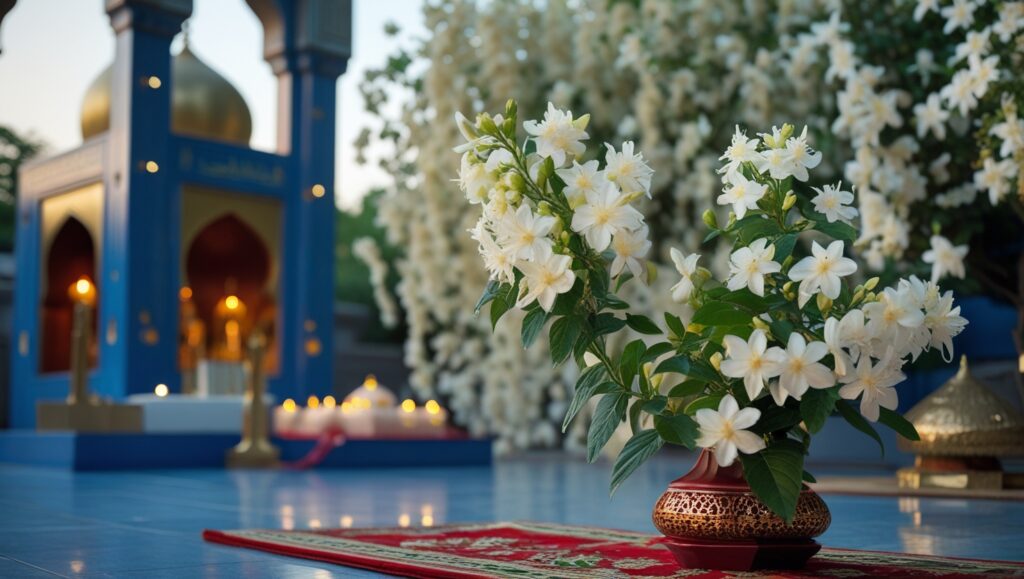
The Jasmine Flower and Its Use in Modern Times
Jasmine flowers are celebrated not only for their symbolic meanings but also for their practical applications in various industries. Their distinct fragrance and therapeutic properties have made them integral to aromatherapy, cosmetics, and culinary products.
Jasmine in Aromatherapy
Jasmine essential oil is prized in aromatherapy for its calming and mood-boosting effects. Extracted through steam distillation, its soothing aroma reduces anxiety and promotes relaxation. Used in diffusers, massage oils, and bath products, jasmine helps with emotional well-being, encourages comfort and joy, and improves mental clarity. It’s also commonly found in sleep aids to help with relaxation and better sleep.
Jasmine in Perfumes and Cosmetics
Jasmine is a key ingredient in luxury perfumes due to its intoxicating fragrance, often blended with rose, sandalwood, and citrus. In cosmetics, it’s valued for its hydrating properties, keeping skin soft and nourished. Jasmine’s mild antiseptic and anti-inflammatory effects make it ideal for skincare products, especially for sensitive or irritated skin, promoting relaxation and rejuvenation.
Jasmine as a Tea Ingredient
Jasmine tea, made by infusing tea leaves with jasmine flowers, is a beloved beverage known for its delicate flavor and numerous health benefits. The antioxidants in jasmine tea boost the immune system, support heart health, and aid digestion. Additionally, its calming properties help reduce blood pressure and promote relaxation, making it an ideal beverage for unwinding after a long day. Jasmine tea also promotes skin health and is enjoyed in various cultures for its social and ceremonial significance.
Jasmine in Traditional Remedies
Beyond its modern applications, jasmine has been used in traditional medicine for centuries. In many cultures, jasmine has been regarded as a natural remedy for various ailments. It has been used to treat symptoms such as insomnia, headaches, and digestive issues. Jasmine is often incorporated into herbal teas or tinctures, believed to have sedative effects that help calm nerves, improve sleep quality, and reduce tension. Some cultures also use jasmine oil for treating skin conditions, such as acne, eczema, and minor cuts, due to its antiseptic and anti-inflammatory properties. Its gentle, soothing effects make it suitable for a wide range of therapeutic uses.
The flower’s role in modern wellness practices underscores its continued importance in promoting relaxation, enhancing beauty, and improving overall health. Whether in aromatherapy, cosmetics, culinary delights, or traditional healing practices, jasmine remains a timeless and versatile flower with a wealth of practical uses.
The Healing Power of Jasmine: Symbolism in Wellness
Conclusion
Jasmine flowers are more than just beautiful blooms; they are rich in symbolism and cultural significance. From their association with love, purity, and beauty to their use in religious ceremonies and modern wellness practices, jasmine continues to be a flower that captivates the heart and soul. Whether used in a wedding bouquet, as part of a religious offering, or in a bottle of luxurious perfume, the jasmine flower symbolizes much more than meets the eye. So next time you encounter a jasmine flower, remember its deep meanings and the centuries of history behind it.
Click the link below to buy “FLOWER Retro Wooden Stand Plant Terrarium with 3 Bulb Glass Vases for Hydroponic Home & Office Décor”

“Click the link below to buy “6-inch modern ceramic planter with glaze, drainage hole, and saucer for indoor & outdoor plants.”
